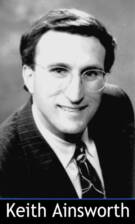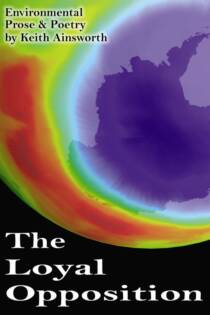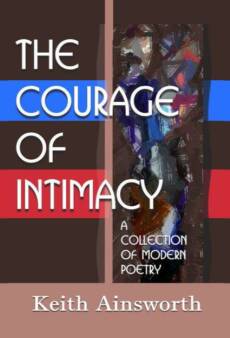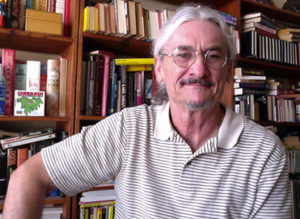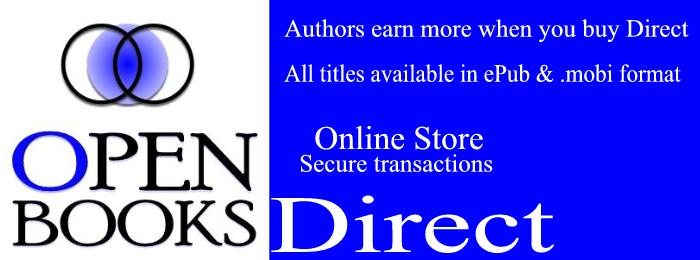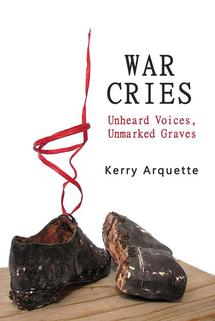©Moronic Ox Literary Journal - Escape Media Publishers / Open Books
Poetry
Five Poems by C. S. Fuqua
Plus an interview with the author
Moronic Ox Literary and Cultural Journal - Escape Media Publishers / Open Books Advertise your book, CD, or cause in the 'Ox'
Novel Excerpts, Short Stories, Poetry, Multimedia, Current Affairs, Book Reviews, Photo Essays, Visual Arts Submissions
"Late"
My wife said I would regret not going.
He was dying eighteen hours away,
a slow death that would put him
on a teaching college’s table,
part of the deal he’d made for treatment.
We’d never met face to face,
developing a friendship through
a mail-order school, letters, and e-mail,
to the point he once called me “brother.”
Gifts came at the most absurd times,
even after he started drinking again
when most of his money drowned in bottles.
And the first questions when we talked
were always about “that baby girl,”
someone he’d grown to love
through my eyes.
I dreamed he drowned two nights
before he stopped breathing,
already a shell of a man,
drifting between realities and dementia.
My wife said I would regret not going then.
I don’t.
I regret not going before.
Presents the Poetry of
Environmental Attorney
Keith Ainsworth
"Mortgaged"
She watched from the old trailer’s doorway
as they dismantled the new double-wide,
only it wasn’t new any longer,
unattended these last six months,
leaking as she weaved through
a second bankruptcy,
brought on by payments
that consumed eighty percent
of her income.
The leak spread,
rotted part of the roof,
the ceiling,
some of the walls,
something she laughs about
after they ruined her credit again,
put a gun to my head --
only they didn’t shoot her,
simply supplied the gun
that happened to be filled
with scattershot.
"Second Thoughts"
He stood at the edge
and considered falling,
those things that may or may not
pass before his eyes
like some high-speed movie,
words and voices chattering
against replies he
could have been proud of,
actions that should have been taken.
He shouted and listened
until his voice returned to him.
He shouted again.
His voice replied.
He looked down,
thought about landing,
about actions,
about voices,
about echoes,
then stepped back
with words on his mind.
Life, death and the relationships we forge between: The Courage of Intimacy is a collection of modern poetry exploring the fundamental human need to connect with others.
"Celebration"
She is almost there,
walking across the stage
to accept the paper
that attests to her achievements.
High school is nearly over,
soon a part of the past
to which she’ll bid good riddance.
I felt the same way,
exactly twice as long as her life ago,
and she rolls her eyes
as my own mist,
her childhood ending,
and every past moment
a reflection of events
we should have noted more thoroughly,
a reminder to pay closer attention
as new achievements loom.
This journey is not over.
No reason to mourn exists.
"Reconnecting"
I’m clean,
he said the last time we talked
I’m over the women, drugs.
Level.
The time before that,
he was dead drunk,
naked in a living room chair
with a knife poised at his throat.
Now he doesn’t call,
and he’s changed his number.
His website lists gigs
three months in advance,
and the band’s stable,
going on eight months now.
Six years or more preceded the knife,
and I suspect it will be
that long before the next time.
But we’re not as young as
we used to be
Read an Interview with C. S, Fuqua
MO: Who, or what, is your inspiration to write?
C.S. Fuqua (CSF): The basic inspiration is a desire to create a story or poem that is entertaining and, if
I’m lucky, has meaning beyond the words on the page, touching the reader on a deeper level. Further, I enjoy exploring motivation and reaction
through the characters, putting myself into other personas perhaps to learn something about why other people react the way they do and why I react the way I do. The authors whose work has inspired me most include Kurt Vonnegut, Jr., Raymond Carver, Shel Silverstein, J.D. Salinger, Nikki Giovanni, and Walter M. Miller, Jr., among others.
MO: When did you start writing?
CSF: In high school, but I would not want to read now any of the drivel that originated back then. I began to write seriously in college, but, again, I would not want to read now what I wrote then.
MO: When did you realize that you wanted to become an author?
CSF: I had an inkling in grade school as I read novels and stories that transported me to other worlds and dimensions, that provided a method to escape my circumstances. I admired the men and women who were able to provide that escape with simple words arranged on a page. I did not make the conscious decision, however, until college, but even then I took a more circuitous route to creative writing than many of my contemporaries may have, working for newspapers and nonfiction magazines before applying myself to fiction.
MO: What is your advice for aspiring authors?
CSF: Find and do whatever works for you. For me, it’s read, write, revise, revise, revise, submit, play. Read, write, revise, revise, revise, submit, play. Read, write, revise, revise, revise, submit, play. And drink a beer.
MO: Do you do research for your books/stories? What kind of research do you do?
CSF: The research varies. Nonfiction obviously requires extensive research and fact verification (contrary to what you see from TV news sources). For fiction, I research as required to make the stories feel real, at least enough (I hope) for the reader to suspend disbelief. For example, I’m finishing a book that a friend who died two years ago and I have been co-writing for the last 16 years. Much of the final revision requires extensive research of the science involved in the plot, such as surviving deep-space travel -- prolonged exposure to weightlessness and radiation and a feasible process for stasis. That research must provide reasonable theories based on current science that will support the fictional science of the future. For stories based on faeries or other beings, I research the accepted histories, cultures, and behaviors of
the beings to retain much of their traditional character while adapting them to the story’s needs and modern settings in which they’re placed.
MO: Do you outline before you start writing?
CSF: Only roughly for short fiction. I usually get an idea, jot down a few notes, and “cook” it for as long it takes, then start writing, attempting to get the first draft down in one sitting. Novels take more planning, more traditional outlining. I have a broad overview of what will transpire from beginning to end, but I jot down the details from chapter to chapter as each preceding chapter dictates the events of the next.
MO: Do you plan ahead before you sit down to write, or do you let the story take you where it wants to go?
CSF: A little of both. As I said, I allow the idea to “cook” before I begin to write, but sometimes what I have in mind when I begin writing doesn’t always materialize on the page. An event or a character can and will change what I originally had in mind, taking me and the story in another direction.
MO: Do you write at a desk, or do you have a laptop that you drag around the house with you?
CSF: Both. I love the old desk I found at a rescue mission thrift store and refinished -- a monstrous secretarial desk from the early 1960s. But I also like mobility, especially when I’m working on a project that takes a lot of time. I like to be outside on occasion or in a room with other people. I prefer to have noise -- music or conversation -- around me when I’m working. When the family’s home, I work in the room where everyone gathers.
MO: Besides a pen/pencil/notepad/computer, what is a must-have while writing?
CSF: Proper references, such as Strunk & White’s The Elements of Style, as well as a thorough guide to grammar and punctuation. Self-publishing is becoming increasingly easy, with traditional publishing headed in the same direction that the music industry has gone, toward independent production, cutting out the middleman, including the editor. The trend may be both good and bad -- good for those who can be both writer and objective editor and can function on all other levels of writing and marketing; bad for those who desperately need the services of an editor, if for nothing more than correcting grammar, spelling, and punctuation. The use of good reference materials is essential.
MO: How did it feel to sign your first publishing contract?
CSF: I felt elated that publication lay ahead, but also rather powerless and at the mercy of those who make the big decisions. Even after three decades of writing, from working as a journalist at the beginning of my career, through freelance nonfiction writing, to writing/publishing primarily fiction and poetry, I still feel rather powerless against the machine because talent is not always the determinant factor in having one’s work selected for publication.
MO: What is your favorite genre to write? Your least favorite?
CSF: Dark fantasy is my favorite because the laws of science are pretty much up in the air, and it’s a great genre for exploring human motivation. My least favorite of the genres in which I like to write is hard science fiction because I’m not a scientist and feel hopelessly inadequate if the story’s plot requires deep understanding and explanation of certain hard science. The use or misuse of science can make or break an otherwise great story. As for other genres, if I don’t like to read them, I don’t write in them.
MO: Is there a genre that you haven't written yet, but you want to try?
CSF: No. I have written and published in the nonfiction, SF, horror, dark fantasy, mainstream, literary, and poetry genres, and I enjoy each. I write in only genres that I enjoy reading.
MO: Tell me a bit about your books? What do you think makes them stand out from the rest?
CSF: Like other authors, I strive to entertain while providing a deeper message in the writing, exploring good and evil, life and death, hatred and love. What makes my stories different? Other than the presentation from my own skewed take on reality, I’m not sure. They are simply stories about hope in the face of desperate loss and futility, even in my novel
Big Daddy’s Gadgets, a satirically comical SF tale of humankind’s penchant for self-destruction. I do not view myself as the writer creating this or that universe, dictating what happens there, but rather as the reader’s companion, attempting to understand what motivates humankind (even when it isn’t human) through the action and characters of the stories.
I’m there to explore and discover, and I hope the companions who join me enjoy the ride as much as I do during the writing. I tend not to explain everything in the stories or wrap them up neatly in the end, and that irritates some editors, causing many rejections over the years, but I believe that readers don’t want to be told everything, that they want to make independent conclusions about parts of the story, that telling the reader everything is insulting. I also enjoy diversity in genre and in characters, twisting the conventional into what I hope is something new or at least fresh. My latest book from Mundania Press, Trust Walk, which gathers a sampling of my stories from over the last 25 years, isn’t the typical collection of sf/df/h that one might expect from a writer of my background. Instead, it collects stories from not only the sf/df/h genres, but also mainstream and literary genres, providing a more complete sampling of my writing career so far.
MO: There are many fascinating historical places in Charleston, South Carolina. Are there any within your books?
CSF: I usually don’t define settings by name and tend to stay away from recognizable places such as cities or well-known destinations. Most of my fiction, but not all, is set in the South, so many of the places in my stories may feel familiar to someone from South Carolina or Georgia or other southern locale, but they may not actually be located in a specific state. For example, “Rise Up,” which appears in the debut issue of Bull Spec, is a dark fantasy story set on the Gulf Coast, but a primary character is from the Appalachian region from where most of the magic in the story originated, so the setting, thanks to the action and characters, might “feel” more Appalachian than Gulf Coast while readers familiar with Pensacola or Mobile might feel the story’s setting as more Gulf Coast than Appalachian.
MO: And, for fun, if you could be anyone for a day - real or fictional - who would you be?
CSF: Given the opportunity to be someone else, at this stage in my life, I’d probably pass it by. I have a hard time dealing with my own weirdness without adding someone else’s to it. It’s best that I stick to territory I’m already familiar with.
MO: What’s up next for you?
CSF: I’m currently completing a book on the history of Alabama’s contributions to music, due out from South Carolina-based The History Press in October 2011. Music is a passion of mine, and it’s been fun researching this book, of course including the usual artists found in similar projects, such as Hank Williams and W.C. Handy, but also and particularly including those artists not usually associated with Alabama, native Alabama artists such as Hugh Martin, Ward Swingle, Wilson Pickett, Urbie Green, and so many others. I’m also working on the SF novel mentioned above. My friend and I completed the first good working draft three days before he died two years ago, with the plot coming together for a touching resolution. It’s one of the most exciting projects I’ve worked on, incorporating cutting-edge science and dark fantasy elements based in the mythologies of Native American beliefs, Buddhism, and Christianity. I
only wish Rob, my co-writer who developed the basic idea and plot for the book, were still here to experience its completion. I think he’d be happy with the result. After that, I plan to return to a character I developed early in my career. He’ll be the subject of a series of connected short stories appropriate for adults and young adults, stories that may be considered both fantasy and mainstream since they’ll be told from the viewpoint of a boy with a vivid and rather warped imagination. Other projects are underway as well, including a collaboration with an artist on a children’s book. And then there are the short stories and poetry. I certainly have enough to stay busy for a good while to come.
For more information about the work of C.S. Fuqua, please visit http://csfuqua.com.
Featured Title
War Cries by Kerry Arquette
(Poetry / Social Conscience)
Germany, post WWI, was a country in crises. Shortages of food, energy, and the deflation of German currency demoralized the population. Seeking scapegoats for their misery, many Germans pointed fingers at German Jews, blaming them for business practices believed to have led to their war defeat and current situation.
Wielding a wand of power, Hitler instigated a plan that would lead to the largest act of genocide in history. Propelled by his belief that German Aryans were superior and therefore destined to rule the world, he plotted to expand German lands so the offspring of these Aryans would have room to expand. Hitler also believed that Jews, Slavs, southern Europeans and all non-white people were sub-humans, fit only to serve his Aryan elite. Using newspapers, books, billboards, posters and impassioned speeches, he launched a campaign to rally the population to embrace his views and support his cause.
Hitler also instigated laws mandating abortion and sterilization for the chronically ill, handicapped, alcoholics and drug addicts. By 1939, many “incurables” were being killed outright. Laws were also passed that allowed “dangerous criminals” such as beggars, alcoholics, and the homeless and unemployed to be imprisoned.
Even as Hitler pursued his military goals, the persecution of German Jews was mounting. Increasing numbers were being sent to concentration camps along with political prisoners, homosexuals and Gypsies. Encouraged by the German government, many Jews fled the country, leaving behind money and possessions. Others dragged their feet, organizing their affairs and making extensive plans for relocation. By the time they were prepared to depart, both transportation and the documentation necessary for immigration were difficult to obtain.
In 1941, Hitler ratcheted up his persecution of Europe’s Jewish population by ordering “The final solution of the Jewish question.” That “solution” was the mass murder of millions of Jews. Many of the Jewish men, women and children that died over the following years were shot by German murder squads made up of soldiers and enthusiastic civilians. Mobile gassing vans were used to murder dozens of Jews at a time. Then larger gas chambers, disguised as shower facilities, were installed in prison camps. Jews, already corralled in sealed ghettos and internment camps, were shipped to these killing centers for extermination.
The war lasted six long years. The toll on human lives was astronomical - more than 60 million people died.
Too often, when confronted with devastation of this magnitude, we tend to view the dead as a statistic - a solid block of entangled nonentities. This approach allows us to maintain a comfortable feeling of emotional detachment so we feel less horrified, frightened and threatened. But to truly understand WWII, we must step into the painting and view the events through the eyes of those who participated. The individual brush strokes that make up the macabre picture are dipped in the blood of men, women and children no different from us.
In the end, the sound of war isn’t heard in the rattle of machine gun fire or the bellowing of bombs. It is in the voices of those who lived and died and the stories they have to share.
Open your heart and listen …
Open Books will publish War Cries in January 2017
Pre-order now at special price
A book of environmental prose and poetry focusing our attention on the day's most critical environmental issues, addressing them in contemporary verse as well as poignant prose.
Upcoming Poetry Selection


